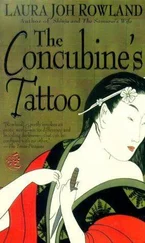Laura Rowland - The Iris Fan
Здесь есть возможность читать онлайн «Laura Rowland - The Iris Fan» весь текст электронной книги совершенно бесплатно (целиком полную версию без сокращений). В некоторых случаях можно слушать аудио, скачать через торрент в формате fb2 и присутствует краткое содержание. Год выпуска: 2014, ISBN: 2014, Издательство: St. Martin, Жанр: Исторический детектив, на английском языке. Описание произведения, (предисловие) а так же отзывы посетителей доступны на портале библиотеки ЛибКат.
- Название:The Iris Fan
- Автор:
- Издательство:St. Martin
- Жанр:
- Год:2014
- ISBN:9781466847439
- Рейтинг книги:3 / 5. Голосов: 1
-
Избранное:Добавить в избранное
- Отзывы:
-
Ваша оценка:
- 60
- 1
- 2
- 3
- 4
- 5
The Iris Fan: краткое содержание, описание и аннотация
Предлагаем к чтению аннотацию, описание, краткое содержание или предисловие (зависит от того, что написал сам автор книги «The Iris Fan»). Если вы не нашли необходимую информацию о книге — напишите в комментариях, мы постараемся отыскать её.
The Iris Fan — читать онлайн бесплатно полную книгу (весь текст) целиком
Ниже представлен текст книги, разбитый по страницам. Система сохранения места последней прочитанной страницы, позволяет с удобством читать онлайн бесплатно книгу «The Iris Fan», без необходимости каждый раз заново искать на чём Вы остановились. Поставьте закладку, и сможете в любой момент перейти на страницу, на которой закончили чтение.
Интервал:
Закладка:
“What was Lord Ienobu getting in exchange?” Sano asked.
“A fleet of battleships with modern weapons, and experts to teach our navy how to operate them.”
“What for? Did Lord Ienobu want them to keep his enemies under control?” The Tokugawa army and navy, with their ships and weapons, seemed adequate to Sano.
“No.” A spark of amused condescension lit Manabe’s teary eyes. “Lord Ienobu is planning to conquer the world.”
Sano was angry because he thought Manabe was joking. “Do you really expect me to believe that?”
Marume laughed in disgust. “Not even Lord Ienobu is that grandiose.”
“Cut off another finger,” Yoshisato said. “That will make him tell the truth.”
“It is the truth!” Manabe cradled his maimed hand and talked fast. “Lord Ienobu is going to start by invading Korea, taking it over, then moving on to China. He’s ordered a hundred thousand guns from the gun makers. He’s stockpiled lumber and stone in Kyushu, to build a new naval base for the troops and ships that will cross the Tsushima Strait to Korea. The ground’s already been surveyed and the plans drawn up. The morning after the shogun was stabbed, he ordered me to send two messages-one to Kyushu, telling the engineers to start building the base, the other to Nagasaki to alert the Dutch that he’ll be shogun soon and they should send him the battleships.”
This plethora of details took the wind out of all protest. Convinced, stunned, and dumbfounded, Sano, Marume, and Yoshisato stared at one another. Then Sano said, “Doesn’t Lord Ienobu know that’s been tried before?”
“Oh, yes.” Manabe grinned with morose pleasure at their reaction. “General Toyotomi Hideyoshi, about a hundred years ago.”
Hideyoshi was a famous warrior of the civil war era. Born a peasant, he’d started as a foot soldier in the army of Oda Nobunaga, a powerful warlord, and risen to the top rank. When Oda died, Hideyoshi succeeded him and eventually controlled most of Japan. He in turn was succeeded by Tokugawa Ieyasu, who’d defeated his rival warlords at the Battle of Sekigahara and united the entire country under his new regime.
“Hideyoshi sent a quarter of a million troops to Korea,” Manabe said. “They took the Koreans by surprise. Within months they’d taken the capital and spread through most of the country. Lord Ienobu has studied the campaign thoroughly.”
“Then he knows what happened,” Sano said. “The Koreans started fighting back. Hideyoshi’s troops suffered from diseases and the severe winter. By the next year, a third of them were dead. The Chinese Emperor sent his army to help Korea. Six years after the invasion, Hideyoshi died, and what was left of his army came limping home. And Lord Ienobu wants to try it anyway?” Incredulous, Sano spread his hands. “ Why? ”
Manabe bristled at the implication that his master was foolish. “He’s not small-minded like everybody else. He’s not content just to rule Japan. He has a bigger vision.”
“A vision?” Marume guffawed. “Is that what he sees with those bug-eyes of his-Lord Ienobu, emperor of the world?”
“If he were, you wouldn’t dare mock him.”
At last Sano understood the reason for Lord Ienobu’s ambition. Lord Ienobu wanted to compensate himself for being deformed and ugly. Ruling the world would show everyone who’d mocked him behind his back and to his face all his life. Sano could pity Lord Ienobu but not condone the means by which he meant to prove his worth.
“He’s blind to the lessons of Hideyoshi’s campaign against Korea,” Yoshisato said with contempt. “It’s hard to win a war so far from home. How do you feed and shelter your troops in enemy territory? And the Chinese and the Europeans have better weapons than we do.” He’d obviously learned his history. “And as far as timing goes, we’re at as much of a disadvantage as Hideyoshi was. He invaded Korea after years of civil war. We’re still recovering from the earthquakes, the tsunami, and the Mount Fuji eruption.”
“Even with a fleet of Dutch ships, Lord Ienobu is sure to lose. Why does he think he can succeed where Hideyoshi failed?” Sano studied Manabe. “I think you know better. It’s your duty to set him straight. Why didn’t you?”
Indignant that Sano would accuse him of shirking his duty, Manabe said, “I’ve tried! Lord Ienobu won’t listen.” He added forlornly, “He thinks he has the gods on his side.”
“Ha!” Marume said. “Now I’ve heard everything!”
Sano wanted to laugh and cry because he’d discovered the last piece of a baffling puzzle, the connection between Lord Ienobu becoming shogun and the destruction of the Tokugawa regime.
Manabe rushed to explain. “Lord Ienobu has had some lucky breaks. Two of his enemies conveniently dropped dead.” Sano remembered the men Toda had told him about. “And there’s been money left on his doorstep, as if by a ghost.”
If he only knew, Sano thought. Hirata had puffed Lord Ienobu up with superstition and hubris and surely brought him the money. Sano deplored Hirata’s actions all the more. Hirata had manipulated Lord Ienobu to do bigger, worse evils. The ghost’s purpose became clear.
“Lord Ienobu probably has no idea how big the world is,” Yoshisato said. “He’s never been outside of Edo. But I can thank him for giving me a broader perspective. While I was on the run from him, I traveled all over Japan. One of the places I went was Kyushu. The Tsushima Strait is so wide you can’t see Korea on the opposite shore. I’ve also been to Nagasaki and seen the barbarian ships.”
“So have I.” Sano recalled how shocked he’d been by that hint of the magnitude and complexity of the world outside Japan. “I’ve seen the foreign maps. Japan is tiny on them compared to China and Europe. I expect they’re more accurate than ours. The barbarians sail all over the world. Nobody in Japan ever leaves. Lord Ienobu’s not to blame for his ignorance.”
The memory of his years as a prisoner and fugitive darkened Yoshisato’s eyes. “He’s to blame for plenty of other things.”
Sano realized that Lord Ienobu was to blame for less than he’d originally thought. Lord Ienobu had contrived the murder of the shogun’s daughter, but he hadn’t murdered Yoshisato. He’d humiliated Sano but not done him or his family any physical harm. And if Lord Ienobu attempted to conquer the world, the consequences-Japan defeated, occupied, and plundered by foreigners-wouldn’t be entirely his fault. The real villain in that picture was Hirata. If not for Hirata’s meddling, Lord Ienobu might never have lifted a finger to make his dream of ruling the world come true. But there was one crime that Sano couldn’t yet lay on Hirata. Lord Ienobu was still Sano’s favorite suspect in the attack on the shogun.
“What should we do with him?” Marume pointed to Manabe.
“Kill me or let me commit seppuku, ” Manabe said with a dignity admirable in a naked, shivering, battered man. “It’s the only way I can restore my honor after betraying my master.”
At last Sano understood why Manabe had confessed: He wanted someone to stop Lord Ienobu from making a terrible mistake. Sometimes betrayal was a duty as well as a disgrace. And Sano needed one more betrayal from Manabe.
“You’re not finished,” Sano said. “Did Lord Ienobu send the assassin to stab the shogun?”
Manabe rallied to resist implicating Lord Ienobu in the worst crime of all. “No.”
“Oh, give me that cleaver!” Marume said.
Attempting to sit up straight, Manabe winced in pain. “You can torture me into saying Lord Ienobu was behind the stabbing, but it won’t be true.”
His conviction persuaded Sano. Yoshisato said, “We’ll take him back with us in case we need him for something else.” He told the gangsters to untie Manabe, then told Sano, “His story won’t stop Yanagisawa and me from going ahead with the war.”
Читать дальшеИнтервал:
Закладка:
Похожие книги на «The Iris Fan»
Представляем Вашему вниманию похожие книги на «The Iris Fan» списком для выбора. Мы отобрали схожую по названию и смыслу литературу в надежде предоставить читателям больше вариантов отыскать новые, интересные, ещё непрочитанные произведения.
Обсуждение, отзывы о книге «The Iris Fan» и просто собственные мнения читателей. Оставьте ваши комментарии, напишите, что Вы думаете о произведении, его смысле или главных героях. Укажите что конкретно понравилось, а что нет, и почему Вы так считаете.












